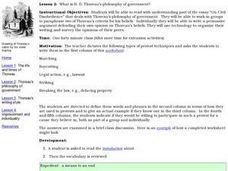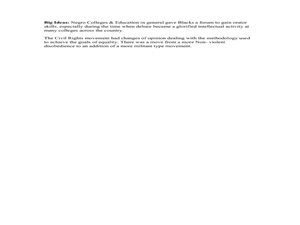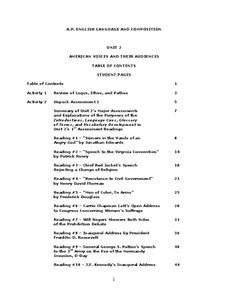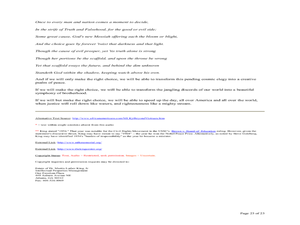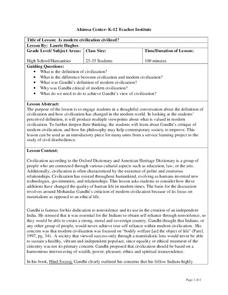Curated OER
Abolitionists in U.S. History
Young scholars read and discuss excerpts from the writings of Henry David Thoreau, Frederick Douglass and Sarah Parker Redmond. They compare and contrast the views of the three abolitionists concentrating on the experiences and reasons...
Curated OER
H.D. Thoreau's Philosophy of Government
Students read an essay by H.D. Thoreau as analysis of his philosophy on government. In this Thoreau analysis lesson, students work in groups to paraphrase two of Thoreau's criteria for his beliefs about government. Students write a...
Curated OER
Civil Rights Methodology Martin Luther King, Jr. – Stokely Carmichael
Students compare and contrast the visions of Martin Luther King, Jr. and Stokely Carmichael. In this African-American history lesson, students read speeches by each of the men and summarize the arguments made by each of them about...
Northshore School District
American Voices and Their Audiences
Those new to teaching an AP level language and composition prep course and seasoned veterans will find much to treasure in a unit that is designed to help young language scholars develop the skills they need to analyze the language...
Curated OER
Satyagraha, Its Origins and Applications
Tenth graders study the steps and methods taken by Gandhi. In this World History instructional activity, 10th graders create illustrations to represent these steps. Students write a persuasive essay on these measures taken by...
Facing History and Ourselves
The Audacity of a Vote: Susan B. Anthony’s Arrest
Susan B. Anthony's speech "Is It a Crime for Women to Vote?" takes center stage in a lesson that asks class members to consider how they might respond to what they consider an unjust law. Groups work through the speech paragraph by...
Curated OER
Muhammad Ali and his Vietnam War Resistance: Defining Nonviolent Action through Gandhi and King
Learners research Muhammad Ali's act of civil disobedience. In this civil disobedience lesson, students research Ali's defiance of the Vietnam War draft and compare his reasoning to Martin Luther King's thoughts on the war. Learners...
Facing History and Ourselves
Life for German Youth in the 1930s: Education, Propaganda, Conformity, and Obedience
The German youth faced an onslaught of propaganda when they went to school, thanks to the Nazi regime led by Hitler during World War II. Pupils relate their education experiences to German youth by analyzing primary source readings,...
Curated OER
Gandhi Lessons and His Legacy of Peace
Gandhi's message of nonviolence and the practice of civil disobedience influenced people around the world.
Curated OER
The Art of Nonviolence: Martin Luther King, Jr., Gandhi, and Concepts of Nonviolence in Indian Art
Students make connections between nonviolent ideals and art. In this visual arts lesson, students discuss the successes of the American Civil Rights Movement and discuss Gandhi's influence on the movement. Students then examine images of...
National Endowment for the Humanities
Revolution '67, Lesson 1: Protest: Why and How
To some people, protesting is as American as apple pie, but the factors that lead to protests can be as confusing to veteran activists as to today's youth. Revolution '67 explores the riots in Newark, New Jersey as a case study. ...
National Endowment for the Humanities
Revolution '67, Lesson 2: What Happened in July 1967? How Do We Know?
Even in a world in which dozens of participants and curious onlookers record every controversial event, the basic facts of what happened are often in dispute. Revolution '67, Lesson 2 explores 1967 Newark, New Jersey using an examination...
Curated OER
Is Modern Civilization Civilized?
Students examine the concept of civility. In this modern civilization lesson, students study Gandhi's teaching about the attributes of civilized societies and discuss how they can contribute to fostering civilization in their own community.
Annenberg Foundation
Migrant Struggle
The American Dream is a goal that many pursue, but is it truly attainable for all people? An in-depth lesson explores the plight of migrants in twentieth-century America. The resource includes a video and author biographies and...
Curated OER
CIVIL DISOBEDIENCE
Students use events of the time to illustrate the significance of the 1965 Selma-to-Montgomery Voting Rights March.
Intersectional Black Panther Party History Project, IPHP
Teaching the History of the Black Panther Party: 5 Essential FAQ’s
What are the facts about the Black Panther Party? Was it, as J. Edgar Hoover contended, a terrorist organization and a threat to national security? Or a group of indviduals bound together by a desire to protect and nurture their...
Facing History and Ourselves
Do You Take the Oath?
Why did so many go along with Nazi policies during World War II? An investigatory unit includes four handouts, reading analyses, classroom discussion topics, and intriguing philosophical questions, helping learners understand the...
Facing History and Ourselves
Laws and the National Community
When it comes to the law, is justice always served? Teach scholars about how law sometimes enables prejudice of entire groups of people with a unit on World War II that includes a warm-up activity, analysis of primary sources,...
PBS
Civic Engagement and How Students Can Get Involved
There is no age limit on civic engagement. Even if your pupils are not old enough to vote, they are old enough to get involved. Show them how with a PBS lesson that underscores the importance of civic participation and models ways young...
Curated OER
The Poor People's Campaign
Learners research and analyze the campaign that was conceived by Dr. Martin Luther King, The Poor People's Campaign. The concepts of poverty and cultural diversity along with the Civil Rights Movement is also covered in detail within...
Curated OER
Ethos, Logos, and Pathos
Students compare and contrast "Letter From a Birmingham Jail" and "Civil Disobedience" by writing a paper using MLA format.
Curated OER
Classroom Management Using Gandhian and Kingian Principles of Nonviolence
Tenth graders study the concept of civil disobedience. In this Current Events lesson, 10th graders participate in a survey that nominates students for hard work and exemplifies nonviolence.
Curated OER
Concept Attainment
High schoolers are introduced to the topic of civil disobedience. Using a historical event, they identify the disobedience act in the event. They explain the significance that civil disobendience played in the events of the 1960s. They...
Curated OER
Thoreau, Gandhi, and Martin Luther King, Jr.
Students explore the concept of non-violent resistance. In this political philosophies activity, students study the political tactics of Mohandas Gandhi, Henry David Thoreau, and Martin Luther King, Jr. in order to discover how each of...
Other popular searches
- Civil Disobedience Thoreau
- Gandhi Civil Disobedience
- On Civil Disobedience
- Thoreau's Civil Disobedience
- Civil Disobedience War
- Thoreau, Civil Disobedience
- Civil Disobedience 60s
- 1960's Civil Disobedience
- Civil Disobedience Thoreau
- Civil Disobedience, Thoreau



